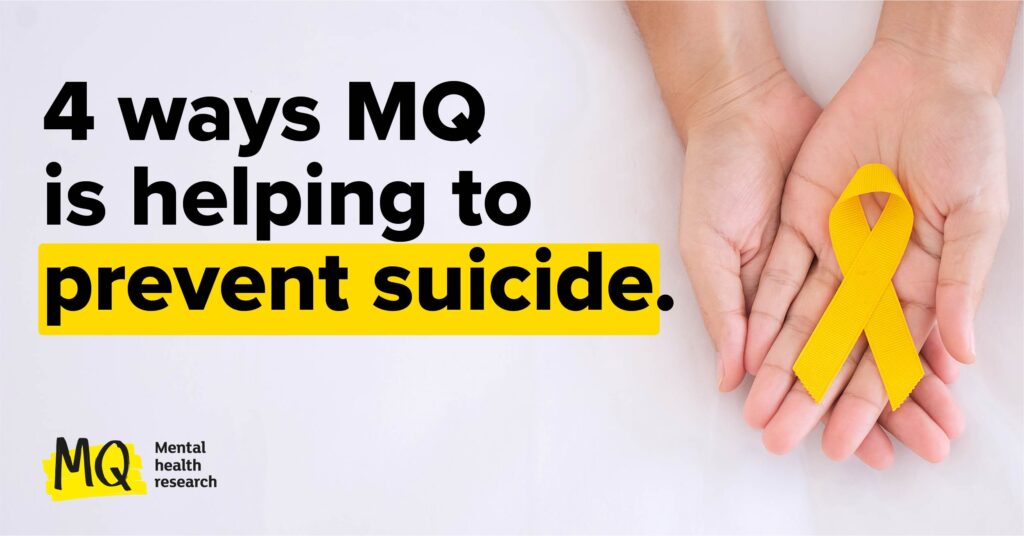[ad_1]
Trigger warning: This post references suicide.
World Suicide Prevention day is approaching. While treatment, resources and support are critical for preventing these tragedies, mental health research also plays an immensely important role in suicide prevention.
That’s why MQ uses donations from people like you to fund mental health research. Here is how your support is helping to save lives.
Predicting who is at risk of suicide
Identifying brain differences associated with suicidal thoughts and behaviours in young people is critical to understanding how these develop and how we can prevent them.
Because of donors like you, MQ was able to fund the HOPES project (Help Overcome and Predict the Emergency of Suicide) which performed analyses of the brain structures of young people with mood disorders and histories of suicide attempts. The experts observed that in a sample of 394 participants with mood disorders, there was a lower surface area of a prefrontal region called the frontal pole in young people who had a history of suicide attempt than those who hadn’t.
The identification of brain structures that cause young people to have thoughts of suicide and attempt suicide, is crucial in understanding why risk for suicide develops, who will engage and transition to suicide behaviour, and in generating new strategies to detect youths at risk and prevent them from dying by suicide.
Preventing repeated suicide attempts
We know that when someone attempts suicide, and are admitted to hospital, the risk that they will attempt to take their own life again remains very high.
An MQ funded study, run by Professor Rory O’Connor and his team at Glasgow University, conducted a study that investigated whether a programme of telephone support, developed for veterans in the US, can be adapted to fill the urgent need in the UK.
He found that the SAFETEL study was both acceptable and feasible. Hospital staff reported that the intervention fitted and complemented existing services, and patients reported that they favoured the simplicity and person-centred approach of the safety planning intervention.
This simple programme is now being implemented across the UK, helping to save lives.
Using school data to identify at-risk children
Nearly one in 10 young people self-harms or has suicidal thoughts. But until recently there was little understanding of the risk factors.
An MQ Funded study, run by Dr Rina Dutta from Kings College London, used data to identify the risk factors so that schools can provide better targeted support.
Rina’s study found that for 10% increase in absence from school there was a 7% increase in odds for self-harm. She also found that the higher a students attainment in school the higher the risk of self-harm.
There are several possible explanations for the above results, including that poor school attendance could result in social isolation which is known to increase the risk of self-harm. Higher academic attainment could be associated with greater pressure to perform, which in turn increases the risk of self-harm.
This study, which was only made possible by MQ’s generous donors, has provided a unique insight into how schools can provide more targeted prevention strategies.
An evidence based roadmap to stop people from being Gone Too Soon
Earlier this year MQ published a ground-breaking paper in the Lancet Psychiatry which called for action on a global scale to put an end to the growing mortality rates of people with mental illness and distress.
The paper, written by 40 global experts, followed an extensive road mapping process of evidence reviews and consultation with mental health researchers, clinicians, policy experts and people with lived and living experience of mental illnesses and suicide.
The group mapped the range of factors which increase the risk of early mortality for people who are suffering from mental health conditions. These include adversities such as traumatic life events, unemployment, stigma and marginalisation, lack of meaningful societal relationships, and poor access to healthcare, education, housing, and income security.
The paper outlines 18 evidence-based recommendations for policy makers, business leaders and health workers the world over which you can read here.
Together we can stop suicide
Through research projects like these, we can better understand why some people experience suicidal ideation and how we can prevent this. It is only though this research that we can improve the support available, early intervention strategies and identification of at-risk individuals.
How your donation can help
Donations help fund studies like these, which give the world a better understanding of mental illnesses and suicide.
When you donate, you’re providing help through research for anyone who is thinking about taking their own life, and that’s a monumental thing.
[ad_2]
Source link
